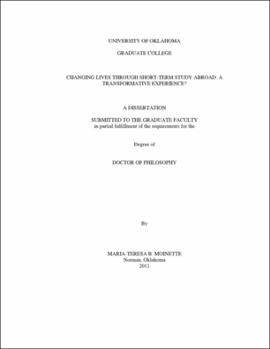| dc.contributor.advisor | Karpiak, Irene | |
| dc.creator | Moinette, Maria Teresa Beatrice | |
| dc.date.accessioned | 2019-04-27T21:33:26Z | |
| dc.date.available | 2019-04-27T21:33:26Z | |
| dc.date.issued | 2011 | |
| dc.identifier | 99294763502042 | |
| dc.identifier.uri | https://hdl.handle.net/11244/319007 | |
| dc.description.abstract | The purpose of this phenomenological inquiry was to increase the knowledge base of | |
| dc.description.abstract | how students who engage in short-term study abroad (2 to 4 weeks), particularly | |
| dc.description.abstract | concerning the possibility for intellectual and education growth. This research also | |
| dc.description.abstract | examined the possibility for a change of perspective of students attending a Midwestern | |
| dc.description.abstract | university. Nineteen students participated in interviews. Semi-structured interviews | |
| dc.description.abstract | were utilized to acquire the necessary data. The themes that emerged from the interview | |
| dc.description.abstract | process demonstrated that central to the learning process for students, who are abroad, is | |
| dc.description.abstract | the role of emotions, not only on their learning, but on their abilities to handle different | |
| dc.description.abstract | sorts of experiences in a positive and constructive manner. | |
| dc.description.abstract | The findings suggest the importance of emotions on the results of learning while | |
| dc.description.abstract | abroad. The literature on short-term study abroad has increased over the past few years. | |
| dc.description.abstract | Yet, the influence of emotions on learning was deemed, by the participants, as | |
| dc.description.abstract | fundamental to their experiences abroad. The sojourn produced emotions of anxiety, | |
| dc.description.abstract | shame, fear, and hesitation, with ensuing positive feelings of excitement, resolve, | |
| dc.description.abstract | attraction, and engagement. Furthermore, the nature of the emotions was recursive, that | |
| dc.description.abstract | is to say, the similar and opposing emotions repeated themselves as a result of external | |
| dc.description.abstract | stimuli. | |
| dc.description.abstract | Other themes also evolved from the data: perspective transformation and a new | |
| dc.description.abstract | sense of self; the educational value of everyday learning; and a short but important | |
| dc.description.abstract | sojourn. In connection with the emotional facets of studying abroad, a new sense of self | |
| dc.description.abstract | emerged where the participants stated feeling more empathetic toward others as well as | |
| dc.description.abstract | acknowledging a growth in self-worth. Additionally, the value of learning in a foreign | |
| dc.description.abstract | environment was both challenging and rewarding. Unique situations were experienced | |
| dc.description.abstract | away from the classroom. These experiences were deemed, by the participants, as more | |
| dc.description.abstract | valuable than the actual educational agenda. | |
| dc.description.abstract | As little research exists to offer enlightenment to the primacy of emotions on | |
| dc.description.abstract | study abroad, this research has provided groundwork for further exploration into the role | |
| dc.description.abstract | of emotions and learning in a study abroad context. Given the perceived value of study | |
| dc.description.abstract | abroad programs in general, and the mounting difficulty of managing and funding longterm | |
| dc.description.abstract | programs, more research is necessary to assess the value of emotions on learning. | |
| dc.format.extent | 177 pages | |
| dc.format.medium | application.pdf | |
| dc.language | en_US | |
| dc.relation.requires | Adobe Acrobat Reader | |
| dc.subject | Foreign study--Case studies | |
| dc.subject | American students--Foreign countries--Psychology | |
| dc.title | Changing lives through short-term study abroad: A transformative experience? | |
| dc.type | text | |
| dc.type | document | |
| dc.thesis.degree | Ph.D. | |
| ou.group | Jeannine Rainbolt College of Education::Department of Educational Leadership and Policy Studies | |
